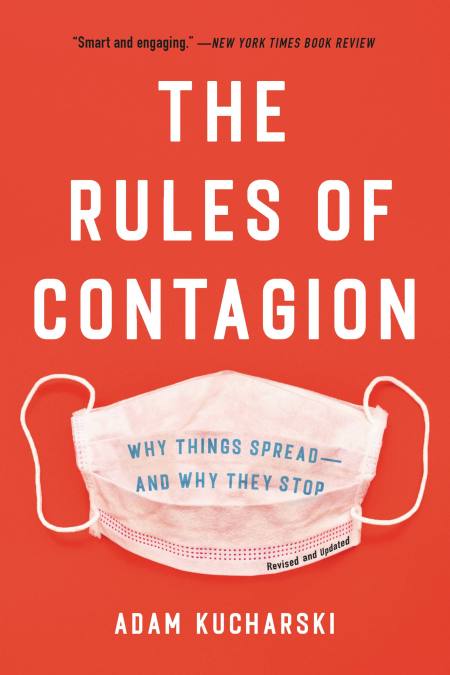Shopping Cart
The Rules of Contagion
Why Things Spread--And Why They Stop
Description
One of the Best Books of 2020 — Financial Times
One of the “Most 2020 Books of 2020” — Washington Post
One of the Best Science Books of 2020 — The Times of London
One of the Best Science Books of 2020 — The Guardian
From fake news to COVID-19, a “smart and engaging” (New York Times) look at why the science of outbreaks is the science of modern life
It’s undeniable that we live in a world shaped by outbreaks. Whether it’s pandemic disease, misinformation, or violence, grasping why exactly some things spread is essential for understanding the world around us. In The Rules of Contagion, Adam Kucharski uncovers the crucial factors driving outbreaks, exploring what it actually means for something to “go viral.” He offers compelling insights into human behavior, ultimately showing us how we can all get better at predicting outbreaks—and how they can be stopped. Revised in light of the COVID-19 pandemic, this is a comprehensive and essential guide to our times.
One of the “Most 2020 Books of 2020” — Washington Post
One of the Best Science Books of 2020 — The Times of London
One of the Best Science Books of 2020 — The Guardian
From fake news to COVID-19, a “smart and engaging” (New York Times) look at why the science of outbreaks is the science of modern life
It’s undeniable that we live in a world shaped by outbreaks. Whether it’s pandemic disease, misinformation, or violence, grasping why exactly some things spread is essential for understanding the world around us. In The Rules of Contagion, Adam Kucharski uncovers the crucial factors driving outbreaks, exploring what it actually means for something to “go viral.” He offers compelling insights into human behavior, ultimately showing us how we can all get better at predicting outbreaks—and how they can be stopped. Revised in light of the COVID-19 pandemic, this is a comprehensive and essential guide to our times.
Newsletter Signup
By clicking ‘Sign Up,’ I acknowledge that I have read and agree to Hachette Book Group’s Privacy Policy and Terms of Use
Praise
"In this smart and engaging tour of epidemiology, written before the pandemic, Kucharski makes a convincing case that just as the arc of an epidemic depends on the transmissibility of a virus and a population's susceptibility to infection, so online contagions obey similar rules."
—New York Times Book Review
"The Rules of Contagion is a fascinating and richly detailed excursion into a science as old as biblical plagues and as current as today's headlines: the science of contagion, of disease, of ideas, of emotions, of everything. This is a book you'll want to spread to your friends."
—Jordan Ellenberg, author of How Not to Be Wrong
"Perfect timing.... Prepares the ground comprehensively for readers to make sense of what is happening today, by distilling the wisdom gathered by studying previous epidemics over more than a century."
—Financial Times
"Learned and lucid.... Coronavirus has prompted hot-headed public and media reaction; this book offers comfort in the form of cold, hard facts."
—The Prospect
"A fascinating exploration of the mathematics of things that go viral--not least of them viruses.... Kucharski takes his readers down provocative detours, such as the use of public-health models of disease transmission to examine how social networks figure in urban gun violence, with algorithms that take into account such things as 'age gang affiliations, and prior arrests.'... Utterly timely and readable."
—Kirkus Reviews
"It is hard to imagine a more timely book ... much of the modern world will make more sense having read it."
—The Times (UK)
"This is a hell of a moment for a book like this to come out ... the principles of contagion, which, Kucharski argues, can be applied to everything from folk stories and financial crises to itching and loneliness, are suddenly of pressing interest to all of us."
—Sunday Times (UK)
"The Rules of Contagion is popular science at its best. The prose is sparkling and clear. The subject is deeply fascinating and highly relevant. Touching on psychology, medicine, network theory and mathematics, epidemiologist Adam Kucharski has written a brilliant and authoritative guide to the hidden laws of how things spread - from ideas and memes, to violence and deadly viruses. An example of its subject matter, this book is also highly contagious: once you have read it, you will want to make sure others read it too."
—Alex Bellos, author of Alex's Adventures in Numberland
—Alex Bellos, author of Alex's Adventures in Numberland
"Rich in stories, The Rules of Contagion is a down-to-earth account of how mathematical approaches can help us better understand and, in turn, better respond to contagion in all its dynamic forms. Tackling issues from pandemics and gun violence, to financial crises and misinformation, Adam Kucharski inspires us all to think like mathematicians. A must read for anybody interested in epidemics and other crises."
—Peter Piot, director of the London School of Hygiene & Tropical Medicine
